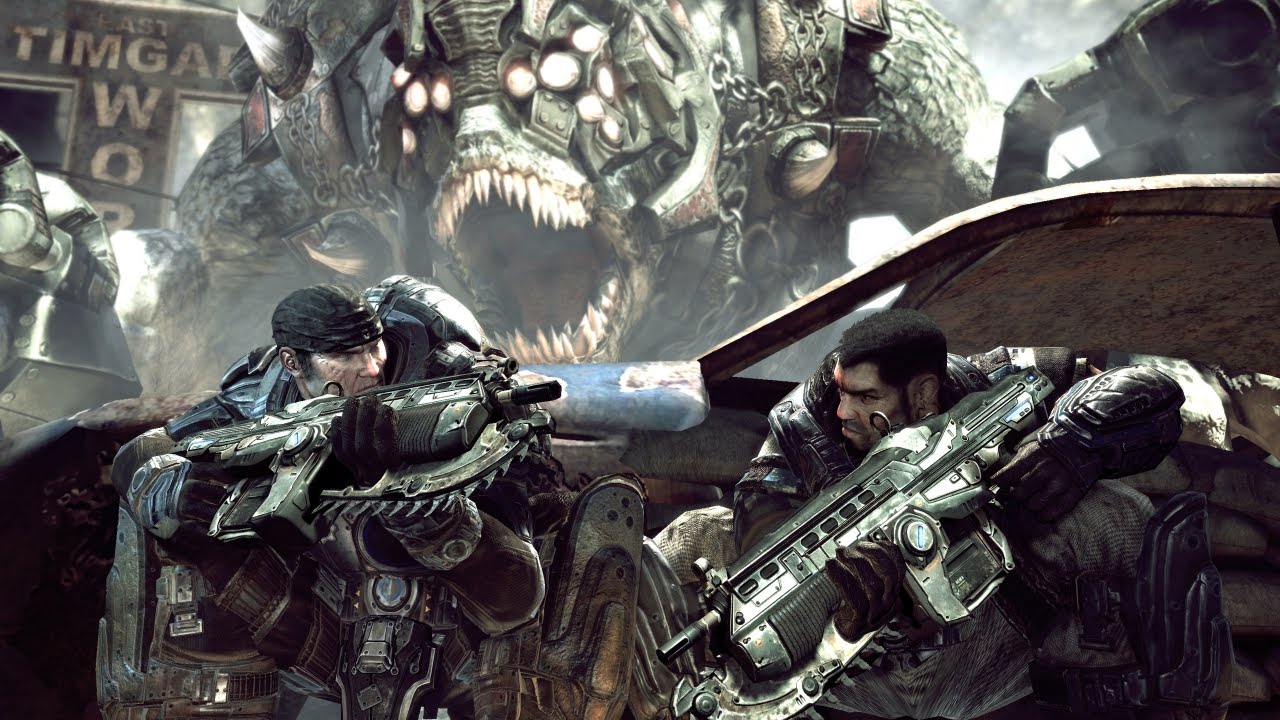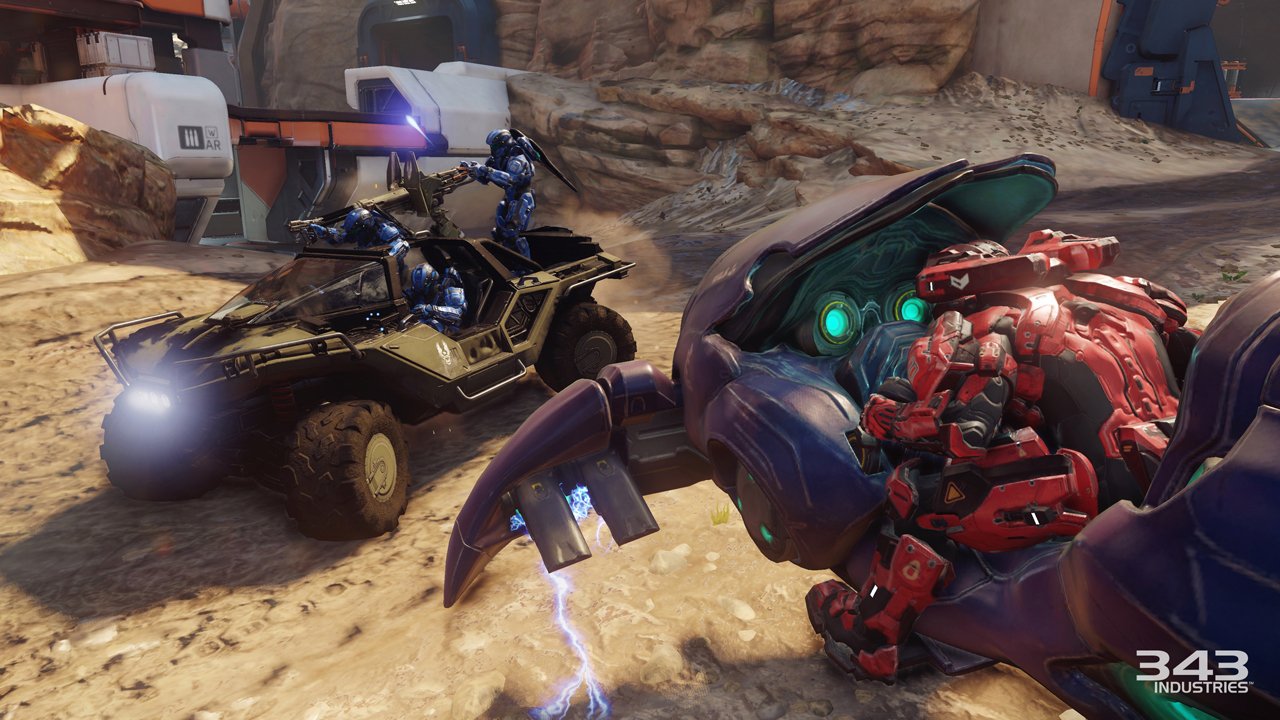What does its greatest games lineup in history say about Xbox?
Let’s start the year with good news - that’s what Microsoft is doing as it pins an epilogue of sound-good statistics to what commercials and Gamestop posters call Xbox One’s “greatest games lineup in history.” Halo 5: Guardians, Forza Motorsport 6, Gears of War: Ultimate Edition and Rise of the Tomb Raider each sold more than a million copies over the holidays and reviewed well enough to all fall between 82 and 87 percent on Metacritic. That’s a good turnout for a system in second place, and helps prove (partially) that the Xbox One is healthy enough to make exclusive games a worthwhile investment, not only for Microsoft and publishers but for players seeking signs of longevity and commitment in their console choice.
More importantly, it backs up what the lineup is ultimately trying to say about Xbox: Hello, we’re back, and we’ve made some more of those games you like. Sorry, what’s that? “Ki-nect?” A CAMERA? Goodness, no, you must be confusing us with someone else.
I can’t dismiss the idea, however, that this particular batch of games fails to tell the ideal story. The lineup may sound abundant and sexy wrapped in a flashy trailer, but its confidence probably comes from a bothersome dearth of anything really new. Rare Replay, one of the best parts of the lineup (and the only one not mentioned amongst the million-sellers) is a compilation of games from as far back as 30 years ago, and Gears of War: Ultimate Edition is a graphical update to a 10-year-old game, which back then stood out as a genuinely fresh action game for the Xbox 360. It’s not wild to suggest the Xbox’s holiday push could have been stronger with a Gears of War equivalent - and it didn’t have to literally be the equivalent of Gears of War.
But let me put aside the boring ol’ complaint over conventionality for a moment - I think there’s a great variety of independent games and third-party efforts on the system in general, and it was just last year that the Xbox One was home to cool, weirdo games like Sunset Overdrive and Disney Fantasia (“Ki-nect?”). I can’t really fault Microsoft for marching its dependable franchises out for the holiday, right alongside the welcome return of backwards compatibility. And despite its nostalgic nature, Rare Replay is a thoughtfully assembled recollection that puts most ‘remastered’ collections to shame. Still, the only unusual game in last holiday’s greatest-ever lineup, Fable Legends, ended up quietly missing the window entirely.

That leaves most eyeballs darting to Halo 5: Guardians, undoubtedly the biggest Xbox One game yet, though its quality (good) wilts alongside its marketing campaign (much better). The vaunted Warzone mode is what people were really talking about, and even it can’t escape the perception of being an elaborate solution to a business problem - namely, if you must have them, how do you make microtransactions in a $60 game feel interesting, intrinsic, desirable and optional, plus, as a bonus, not utterly despised?
The developers at 343 take a shot at it by having Warzone run on a card-based economy - you unlock cards as you play normally, you can buy more, and you can use powerful ones to summon tanks and such only when certain conditions are met. I suspect, given that card packs call the server before they’re opened, 343 could be managing the distribution of card wealth across all players in fairness. But perception rules: if someone has a bad round and it just feels like the other team used money to gain an unfair advantage, they probably don’t care whether or not it’s regulated behind the scenes.

Bracing yourself for one more transaction ends up being a reflex in nearly every game in the Xbox’s greatest-ever holiday lineup. Now Forza Motorsport 6 has card packs too, except they’re for mods that influence the condition of individual races. Turn 10’s racing sim is also notable for introducing its microtransaction tokens quietly, after launch and after reviews, with the wise option of hiding related prompts from the game entirely. You’d think card packs wouldn’t extend to a single-player game like Rise of the Tomb Raider but, nope, you’d be wrong. The 'Expedition Cards' enable different abilities, conditions and challenges in Tomb Raider's score-driven modes. Taken as a whole, then, it’s hard not to read the Xbox holiday lineup as a portent of the card packs to come.
Sign up to the GamesRadar+ Newsletter
Weekly digests, tales from the communities you love, and more
When you take the greatest-ever Xbox lineup as a statement of broad appeal, it doesn’t fully convey the quality and value implied by Microsoft’s excellent marketing. These games are certainly well made, graphically competitive - helping diminish some of the Xbox One’s ongoing narrative of hosting weaker versions of third-party games - and they cater exclusively to what we think of as typical players and genres. At the same time, however, they feel predictable and compromised in annoying ways. The very best one, Rise of the Tomb Raider, will be playable elsewhere (that’s kind of unfair, but we are talking about a console making a case for itself). Most of them come with some financial strings attached, can’t keep pace with the extravagant promises of Microsoft’s marketing and, as a whole, feel less like the Xbox One finding itself and more like it having a comfy lie-down in the Xbox 360’s shadow. Microsoft has come this far to go back again, Gears of War and all.
This doesn't appear to have injured Microsoft over the holiday, so I wonder what lessons it’ll really learn once the dust settles. Will our response be read as YES, MORE OF THIS PLEASE, or, as a first large step to reclaiming and surpassing the Xbox 360’s domain? Already, Microsoft is saying this “greatest” lineup extends into 2016, represented by next-generation games like Quantum Break, Cuphead, ReCore, Sea of Thieves, Crackdown 3 and many more. That sounds like a lineup befitting the risks and capabilities of a new console with clout, and perhaps the reward will be, unquestionably, the greatest lineup we’ve ever seen from Xbox.
Ludwig Kietzmann is a veteran video game journalist and former U.S. Editor-in-Chief for GamesRadar+. Before he held that position, Ludwig worked for sites like Engadget and Joystiq, helping to craft news and feature coverage. Ludwig left journalism behind in 2016 and is now an editorial director at Assembly Media, helping to oversee editorial strategy and media relations for Xbox.



